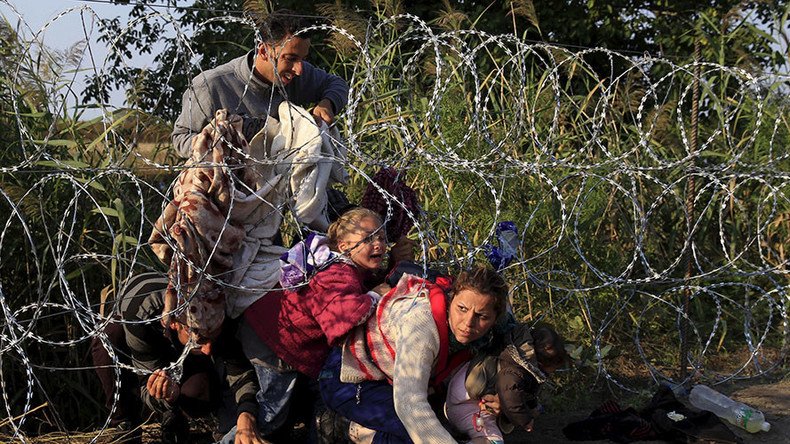Hungary ‘militarized borders’ to deter refugees, says Amnesty ahead of crucial vote on quotas

Amnesty International has released a report denouncing the way Hungary is treating asylum-seekers ahead of a vote in the country on Sunday to decide whether to accept an EU quota system for resettling refugees.
Human rights group Amnesty International accused Viktor Orban’s government of promoting xenophobia and mistreating refugees in a report titled “Stranded Hope” published on Tuesday.
“The Hungarian authorities sought deliberately, painstakingly and proudly to prevent refugees from reaching its soil,” the first paragraph of the 28-page report, which indicates a vast number of human rights violations, states.
The document also covers the stories of refugees stuck in a so-called “transit zone” who reported “beatings, kicking and chasing back with dogs and unlawful returns (or “push backs”) to Serbia” carried out by Hungarian law enforcement officials.
The report accuses Hungary of being reluctant to implement EU refugee policies. It describes measures introduced in July aimed at tackling the refugee crisis as a package “blatantly designed” to make the life of an asylum-seeker unbearable and thus forcing them to seek shelter in other countries.
“The toxic rhetoric of Prime Minister Viktor Orban, calling asylum-seekers ‘poison’, has trickled down to the level of local government and often permeates the context, in which police and local asylum centers operate,” Amnesty said.
The claims of police abuse described in the Amnesty report were described as “sheer lies” by presidential spokesman Zoltan Kovacs, who said an investigation has already found them to be false, DW reported.
READ MORE: Hungary set to build second fence on Serbian border to stop migrants – Orban
He added that some integration assistance and reception centers were closed “because migrants very consciously misuse the existing system.”
Hungary currently considers only 15 asylum claims a day, strictly dismissing all single men, who, according to the report, usually end up being detained for nearly four weeks. The practices were condemned by Human Rights Watch back in July in a report that said Budapest had failed to comply with international standards regarding asylum seekers.
The Amnesty International report comes ahead of a referendum on migrant quotas this Sunday. Polls suggest that at least 70 percent of Hungarians are most likely to follow their president’s call and vote against the EU’s plan.
“We have to be very clear. We will never, never, ever accept the mandatory quota for migrants,” Hungary’s leader said on September 25.
The issue of the referendum on the EU proposal arose in Hungary after the country found itself among the hardest-hit EU member states with tens of thousands of asylum seekers arriving last year.
In autumn President Orban sealed off the southern border with a wire fence to stop the flow of asylum seekers. The measures were taken after authorities estimated that as many as 1,500 illegal migrants passed the Hungarian border every day, with most of them having taken the so-called Balkan route and moving further to Germany.
Germany is one of a minority of EU states that sticks to an open-door policy and welcomes refugees. Most of the eastern and central European countries, such as Czech Republic along with Slovakia, Romania and Poland objected to the EU quota system. In December 2015 Austria was also compelled to erect a fence.
In May the EU came up with a new version of a plan to deal with the unprecedented influx of refugees to Europe, requiring the bloc members to accept certain numbers under a quota system and imposing €250,000 ($280,000)-per-migrant fines if a country fails to stick to the plan.














